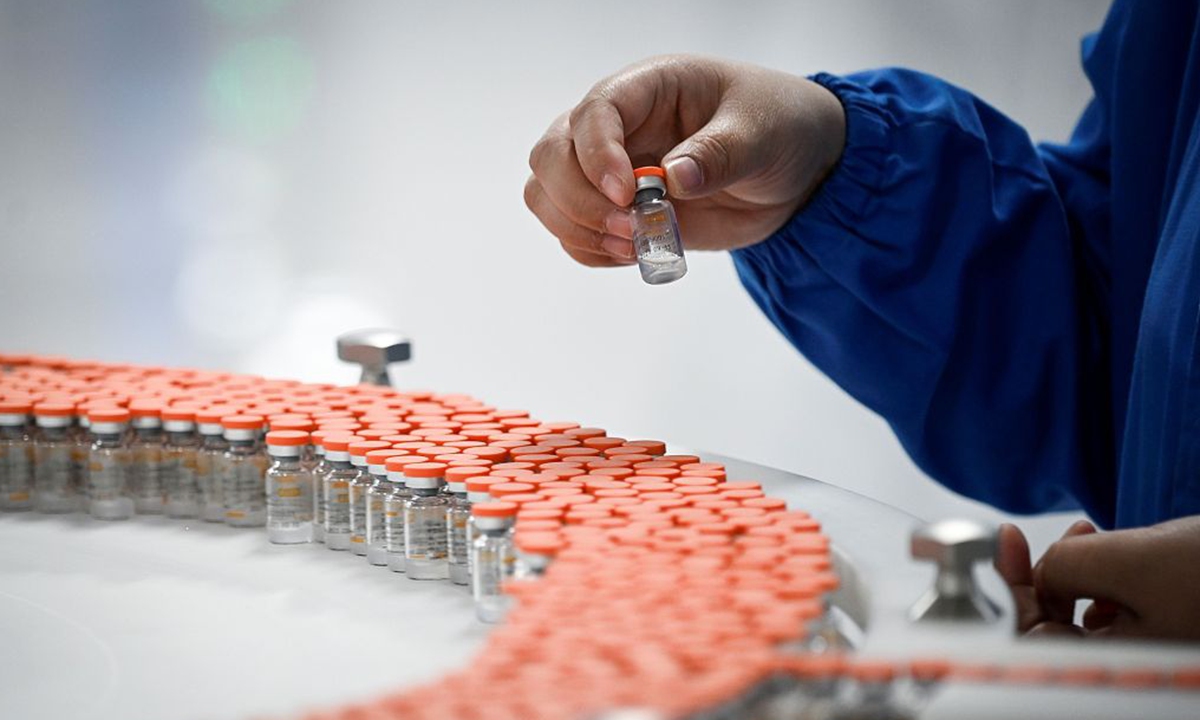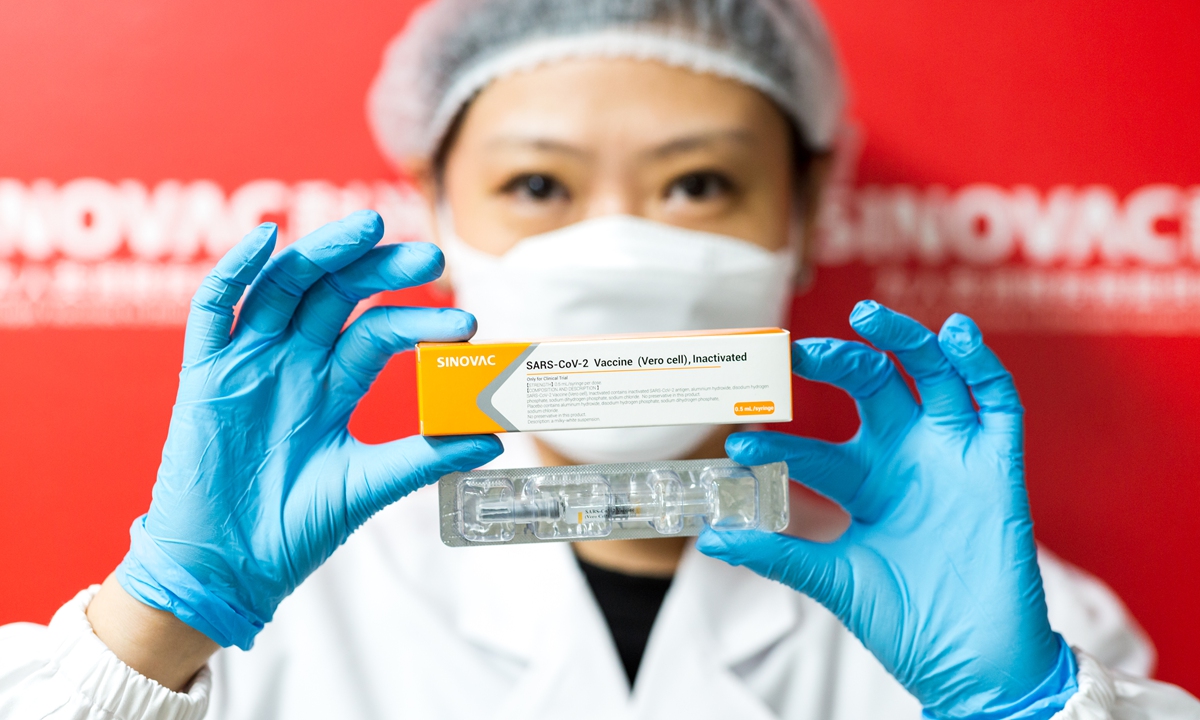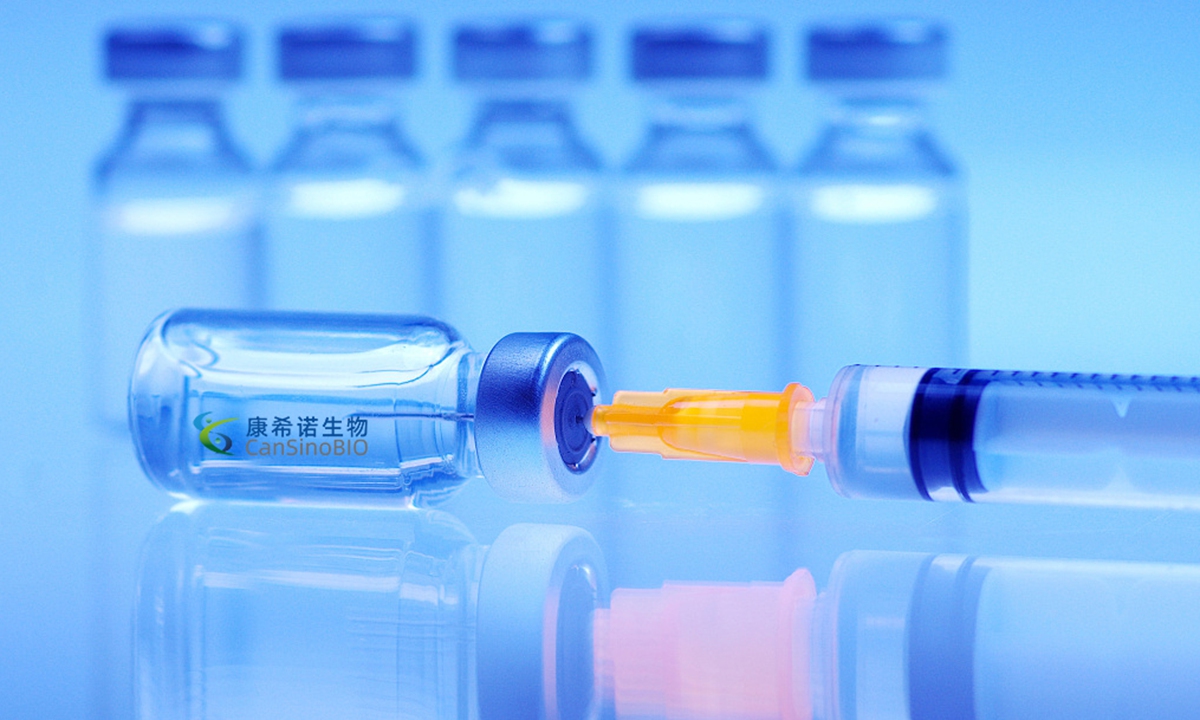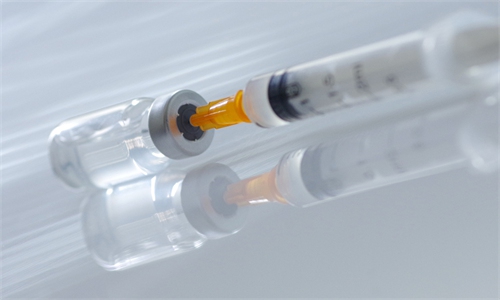
Photo:VCG
Just as US pharmaceutical giant Pfizer was reported to cut in half its original doses due to supply chain-related obstacles, a top Chinese expert said that China could roll out as many as 600 million doses of injections before the year's end, marking the start of what could shape up to be a fierce competition for production of vaccine, where the countries' supply chains and technological prowess will be on test, after the initial research and development stage.
Chinese enterprises, experts and industry practitioners said that China can guarantee smooth production of COVID-19 vaccines with sufficient raw materials, production lines and mature production technology, and could probably take the lead in terms of global supply. Also ensuring smooth production is that the type of technologies used in the development of main Chinese vaccine candidates are much more mature and better fit in the country's existing robust supply chain.
There are different kinds of COVID-19 vaccines in the world including inactivated vaccines and mRNA vaccines, which require different materials, production capabilities and distribution methods, according to experts.
"Different from the inactivated Chinese vaccines, the US vaccine is similar to the genetic engineering method used to make mRNA vaccine, the operation of which can be easier," Yang Zhanqiu, deputy director of the pathogen biology department at Wuhan University, told the Global Times on Friday.
However, the relatively easier operation process of US vaccines does not necessarily mean a shorter production circle. There can be a shortage in production lines, and the cells for vaccines take time to grow, which can limit vaccine production, Yang said.
Pfizer has not responded to a request for comment over its reported supply chain challenges as of press time.
"It can take years to build a vaccine production line from scratch, and months to half a year, at least, to modify a vaccine production line to make COVID-19 vaccines, because serious reviews and compliance procedures are also needed," said Yang, noting that if the production line needs to be increased, enough raw materials will be required too.
Yang noted that China should have more production lines than the US, partially because of its huge population that needs more vaccines. Yang also said that many medical production lines have been transformed into those for COVID-19 vaccines, resulting in some shortages of influenza-type vaccines in China this year.
Experts introduced that the main characteristics of inactivated vaccines are that they are closest to the structure of the natural virus, thus improving the human body's immune response.

Inactivated COVID-19 vaccine CoronaVac produced by Chinese vaccine developer Sinovac Photo: Courtesy of Sinovac
An inactivated vaccine is stable and can be transported at 2-8 C, making it easier to transport in cold chain than mRNA vaccines, which require a cold chain transport of -70 C.
"Nearly all COVID-19 vaccines in China are produced using the Vero cell culture method, which is a very mature technology that China has complete production chains for, because rabies vaccines and other inactivated vaccines are also produced using this technology. There should be no supply shortage on the industrial chain of vaccine production in China," Tao Lina, a Shanghai-based expert on vaccine and immunology, told the Global Times on Friday.
The production capacity of rabies vaccines can be easily transferred to produce COVID-19 vaccines due to the similar technologies used. China issued 58.83 million rabies vaccines in 2019 and 34.17 million in the first half of 2020, an increase of 27.7 percent year-on-year, according to data from the National Institute for Food and Drug Control.
Tao also showed a COVID-19 vaccine produced by Sinovac, a leading vaccine producer in China. "It was produced in the middle of April, which means it takes approximately three months to make a COVID-19 vaccine if enterprises' production is in full swing.
A salesperson surnamed Ye of Shanghai EKBioscience Co., a company that provides Vero cells for lab use, told the Global Times that there are enough frozen cells in stock, 1,200 yuan ($183.7) per virus strain. It takes a week to resuscitate the cells.
According to Ye, Vero cells need to be reserved in cell culture medium including DMEM, fetal bovine serum and cell incubator with carbon dioxide at a 5 percent concentration.
A manager surnamed Jia of Shanghai XP Biomed Ltd., a company that produces cell medium, told the Global Times on Friday that the company has sufficient supply. "As far as I know, there is no such shortage problem in the cell medium industry in China," said Jia.
DMEM needs to be stocked at a temperature of between 2-8 C, the same as a COVID-19 inactivated vaccine.
"Vaccine companies, including some of the biggest in China, made orders for cell incubators from our enterprise. We have more than 600 different types of incubators and we have sufficient reserves and output capacity," a manager of Santn Instrument Co, a Shanghai-based medical device manufacturer, told the Global Times.
According to the instruction of the SARS-CoV-2 vaccine provided by Tao, trims include common salt, sodium hydrogen phosphate, sodium dihydrogen phosphate, and aluminum hydroxide, which Tao said are common trims for vaccines in China with sufficient supply.
As of Wednesday, there were 214 vaccines under development worldwide. Among them, 51 have entered clinical trials, and 14 have entered Phase III clinical trials, of which six are from China.
"China plans to approve 600 million doses of inactivated COVID-19 vaccines on the market this year," said Wang Junzhi, an academician and a member of the national vaccine research and development (R&D) specialist group, on Friday.
Vaccine enterprises' production is not only in full swing, but they are also building new production lines or transferring current production lines to guarantee sufficient supply of COVID-19 vaccines.

Photo:VCG
Chinese vaccine developer CanSino Biologics has been actively planning its capacity construction, the company said in a briefing sent to the Global Times on Friday, noting that it is also actively seeking partners to ensure its capacity and follow-up supply of COVID-19 vaccines.
Rongan Biological Pharmaceutical Co., one of the main suppliers of rabies vaccines for human use in China, told the Global Times on Friday that its COVID-19 vaccine production base in the Ningbo Free Trade Zone (FTZ) in East China's Zhejiang Province has not started production. The base was planned to be put into use in March and produce COVID-19 vaccines in the first half of 2021, according to an announcement by the Ningbo FTZ in July.
As for vaccine packaging, the China Association for Vaccines stated in May that the annual output of vaccine vials in China can reach at least 8 billion, which can fully meet the demands of COVID-19 vaccines.
A salesperson from Shandong Pharmaceutical Glass Co., an A-share listed company and a major vaccine packaging manufacturer, told the Global Times on Friday that the supply of vaccine vials is sufficient.
"If China were to approve 600 million doses of COVID-19 vaccines this year, our company alone can accommodate it," said the salesperson.

